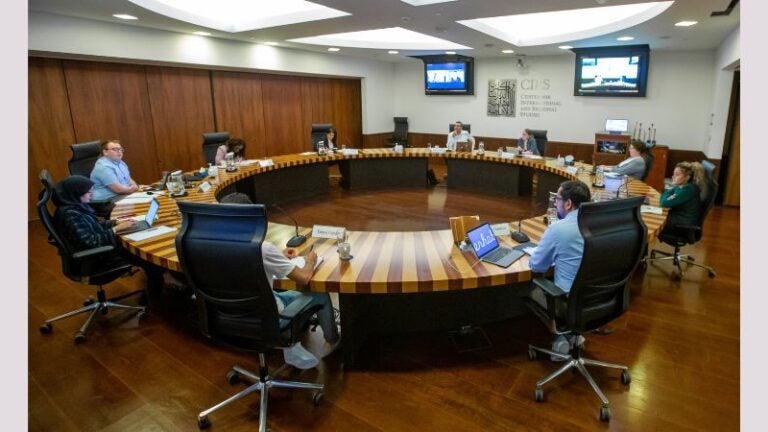American Studies, CIRS Faculty Research Workshops, Environmental Studies, Regional Studies
Affects of Energy Transition Working Group II

On September 5, 2022, the Center for International and Regional Studies held a second working group under its research initiative on Energy Humanities. The meeting was organized as a hybrid event, which allowed for both in-person and virtual participation. The convened scholars received critical feedback and commentary on the draft chapters that they had submitted prior to the meeting.
Animesh Chatterjee initiated the discussion with his paper titled, “Everyday Experiences of Energy in Colonial Calcutta’s Domestic Spheres, c. 1875-1940s.” He explained that in late-nineteenth and early twentieth century Calcutta, appeared in Calcutta as both a source of illumination in public and domestic spaces, and as a complex metaphor in the intellectual articulations of contemporary social and political thoughts. Using the metaphor of braiding, Chatterjee’s article provides a contemporary recollection of colonial and nationalist debates over electric use in domestic and public spaces and looks at ways in which historical narratives influence these affective engagements. The paper examines and analyzes differing positions of address and representations of electricity both as a symbol of material and cultural progress, and as a symbol of “Western” modernity and material culture harmful to the Bengali individual, family, and society. Overall, the paper highlights how electricity accentuated heterogenous views on modernity, nationalism, and culture within Bengali society.
Ewan Gibbs then led a discussion on his paper, “Lives in Energy: Understanding Testimonies from Britain’s Coal, Power, and Oil Sectors.” Gibbs argued that across various energy sectors, including coal, oil, gas, and nuclear, workers engaged in energy generation have a common view of their centrality to the British economy but also share a sense of invisibility in dominant public debates. These trends have magnified through the privatization of electricity since the 1990s, concurrent with the broader impacts of deindustrialization, which have left skilled manual workers peripheral to Britain’s economic imaginary. This paper addresses the role of labor in energy histories using worker testimonies collected in life-story oral histories from Scotland, England, and Wales. Gibbs aims to shed light on workplace experiences since the middle of the twentieth century, a period marked by major changes in Britain’s energy economy including the building of large new power stations under public ownership, the contracting significance of coal mining and burning, and the beginning and maturing of new form of generation including North Sea oil and gas extraction and the nuclear project. His paper assesses how workers in varied energy sectors constructed their relationship to their workplace and locality and dealt with the contradictory affective dimensions of place attachment.
Anne Pasek shifted the discussion to contemporary energy affects with her paper, “Unalienating Carbon: Affect and Labor in Emerging Carbon Sequestration Markets’ Theories of Value.” Her article looks at the process of carbon removal, particularly in the biochar and regenerative agriculture communities. Using the framework of affect and work Pasek argues that carbon removal in these industries is effortful, manual, and impactful. Through their labor, practitioners not only bring tangible changes in the landscapes and materials they work with but are themselves affected by the work they do to intervene in the climate system. Using the documentary media produced about the artisanal communities, as the source material, Pasek’s paper explains how affect plays a central role in both driving and sustaining the work done by these communities and how it shapes their apprehensions and relations to the carbon cycle.
Victoria Googasian then discussed her paper titled, “Infrastructural Character: Space Opera’s Energetic Imaginary.” Using three space operas examples–Star Trek Discovery, Dune, and Nova–as case studies, Googasian’s paper explores how these texts diverge from the genre’s tropes of endless imperial expansion and human power over material environments. These novels imagine human futures that depend on vast reserves of energy, but they depict characters who are materially embedded in their energy systems and are characterized by embodied vulnerability. The three texts are used to further examine the role of these infrastructural characters during the energy transitions taking place in these literary works.
The participants will revise their draft papers based on the feedback received during the discussions. CIRS will work with the faculty leads of the project, Professors Firat Oruc, Trish Kahle, and Victoria Googasian to submit the final for publication as a journal special issue.
- To view the working group agenda, click here
- To read the participants’ biographies, click here
- Read more about this research initiative
Participants and Discussants:
- Zahra Babar, CIRS – Georgetown University in Qatar
- Misba Bhatti, CIRS – Georgetown University in Qatar
- Animesh Chatterjee, Technische Universität Darmstadt
- Ewan Gibbs, University of Glasgow
- Vicky Googasian, Georgetown University in Qatar
- Trish Kahle, Georgetown University in Qatar
- Suzi Mirgani, CIRS – Georgetown University in Qatar
- Firat Oruc, Georgetown University in Qatar
- Anne Pasek, Trent University
- Elizabeth Wanucha, CIRS – Georgetown University Qatar
Article by Misba Bhatti, Research Analyst at CIRS